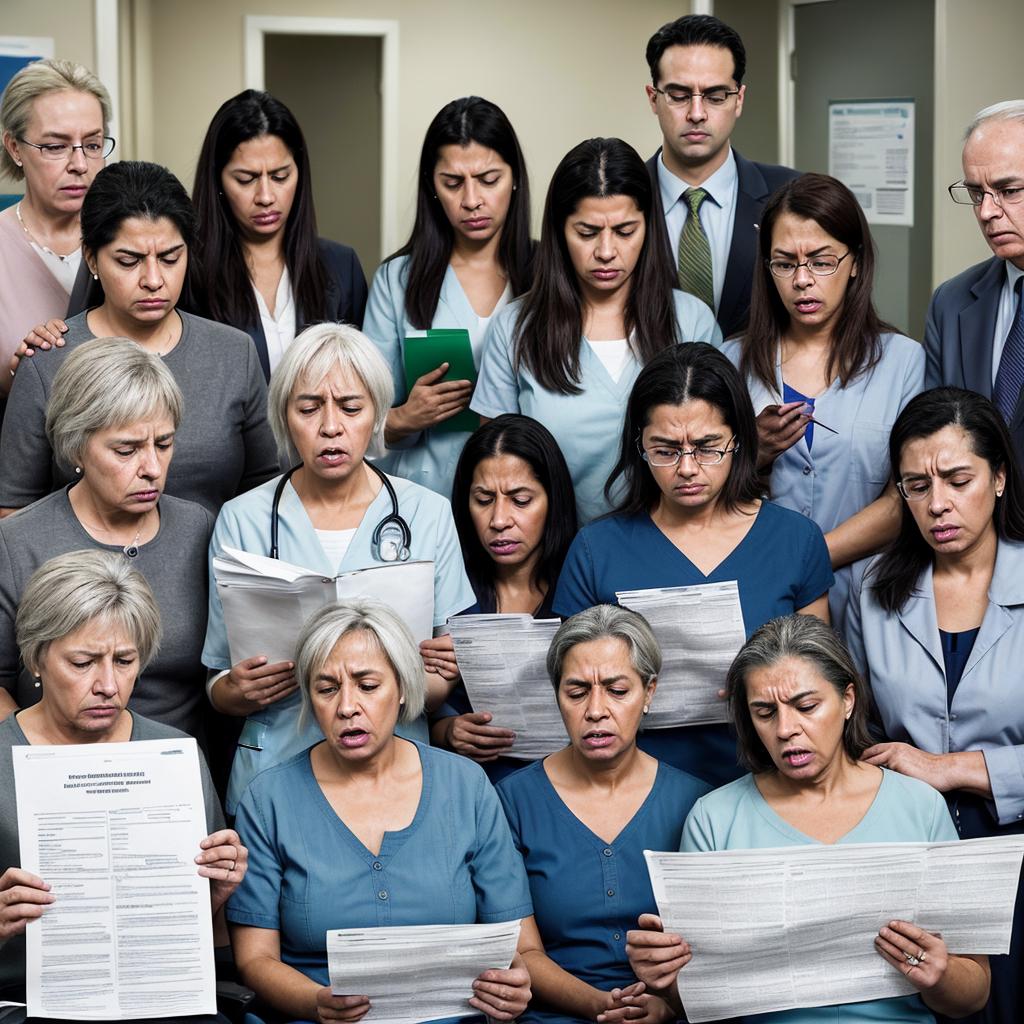6 Common Reasons for Denied Medicaid Applications

Are you tired of dealing with denied Medicaid applications? Well, worry no more! In this article, we will uncover the six most common reasons why your Medicaid application might get denied.
From insufficient income documentation to missing supporting documents, we’ve got you covered. Stay tuned to learn how to avoid these pitfalls and increase your chances of getting approved.
Don’t let these roadblocks stand in your way any longer; let’s dive right in!
Key Takeaways
- Insufficient documentation and incomplete application forms can result in denied Medicaid applications.
- Inaccurate or inconsistent information, such as failure to report all sources of income or incorrect reporting of assets, can lead to application denials.
- Missing supporting documents, such as required supporting documents or lost/misplaced documents, can result in denied Medicaid applications.
- Failure to provide necessary updates, such as promptly updating income changes or informing Medicaid about address or health insurance coverage changes, can lead to application denials.
Insufficient Income Documentation
If you fail to provide sufficient income documentation, your Medicaid application may be denied. When applying for Medicaid, it’s crucial to accurately and thoroughly document your income to ensure your eligibility. Medicaid is a government program that provides healthcare coverage for low-income individuals and families, so income verification is a critical component of the application process.
To verify your income, you’ll typically need to provide documents such as pay stubs, tax returns, and bank statements. These documents serve as evidence of your income and help determine whether you meet the income requirements for Medicaid. It’s essential to provide current and accurate income information to avoid any delays or denials in your application.
One common reason for denied Medicaid applications is the failure to provide all required income documentation. If you omit or provide incomplete information, it can create confusion and make it difficult for the Medicaid office to determine your eligibility. It’s crucial to carefully review the application requirements and ensure you have gathered all necessary income documents before submitting your application.
Incomplete Application Forms
When it comes to incomplete application forms, there are a few common issues that can result in a denial of your Medicaid application.
One of the most frequent problems is missing required documents, such as proof of income or identification. Illegible handwriting on the forms can also make it difficult for the Medicaid office to review your application accurately.
Additionally, providing incorrect or outdated information can lead to a denial as well. It’s crucial to carefully review and fill out all sections of the application to ensure a smooth and successful process.
Missing Required Documents
To avoid having your Medicaid application denied, make sure you include all required documents and complete the application forms accurately. Missing required documents is a common reason for denial. When submitting your application, ensure that you have included all the necessary documents, such as proof of income, identification, and residency. Medicaid requires specific documentation to determine eligibility, and failing to provide these documents can result in your application being denied. It’s crucial to carefully review the application requirements and gather all the necessary paperwork before submitting your application. By doing so, you can increase your chances of a successful application and avoid any delays or denials.
Now, let’s move on to another common reason for denied Medicaid applications: illegible handwriting on forms.
Illegible Handwriting on Forms
Ensure that you legibly complete all sections of the application forms to avoid the denial of your Medicaid application due to illegible handwriting. Illegible handwriting on forms can lead to confusion and errors during the review process, potentially resulting in a denial of your application. When filling out the forms, take your time and write clearly in a neat and legible manner. Use black or blue ink to ensure that your handwriting is easily readable.
Illegible handwriting can cause delays in processing your application, as it may require additional time for the reviewers to decipher the information. By taking the time to complete the forms neatly, you can help prevent any potential issues and increase the chances of your Medicaid application being approved.
Moving on to the next section, it’s important to be aware of the potential denial of your application due to incorrect or outdated information.
Incorrect or Outdated Information
To avoid the denial of your Medicaid application, make sure to provide complete and accurate information on the application forms. Filling out the forms correctly is crucial in ensuring your eligibility for Medicaid coverage.
Here are some common mistakes to avoid:
- Providing outdated information: Make sure to update your personal details, such as your address, phone number, and employment status.
- Incomplete application forms: Fill out all the required fields and provide all the necessary documentation to support your eligibility.
- Misspelling or incorrect information: Double-check your application for any spelling errors or incorrect information that may lead to confusion or misunderstandings.
- Failure to disclose all assets: Be transparent about your financial situation and disclose all assets and income accurately.
- Neglecting to include supporting documentation: Ensure you include all necessary documents, such as proof of income, residency, and citizenship.
Failure to Meet Eligibility Criteria
When it comes to Medicaid applications, failure to meet the eligibility criteria can lead to denial. One common reason for denial is incomplete application documentation, where applicants fail to provide all the necessary paperwork or supporting documents.
Another reason is exceeding the income limits set by Medicaid, which means that the applicant’s income is above the threshold required to qualify for the program.
It’s important to thoroughly review and meet all the eligibility criteria to avoid any potential issues with your Medicaid application.
Incomplete Application Documentation
You may be denied Medicaid if you fail to provide complete documentation that proves your eligibility. When applying for Medicaid, it’s crucial to ensure that you submit all the required documents to avoid any delays or denials.
Here are five common issues related to incomplete application documentation that can result in a denial:
- Failure to provide proof of income: Medicaid requires applicants to provide documentation that verifies their income, such as pay stubs, tax returns, or bank statements.
- Lack of proof of residency: You must provide documents that establish your residency, such as a lease agreement, utility bills, or a driver’s license.
- Missing information on assets: Medicaid considers your assets when determining eligibility, so it’s essential to provide accurate information about your savings, investments, and property ownership.
- Incomplete medical records: Medicaid may require medical records to determine your health condition and need for coverage, so it’s important to provide complete and up-to-date medical documentation.
- Failure to submit required forms: Medicaid applications often have specific forms that need to be filled out, so make sure you complete all necessary forms and submit them along with your application.
Exceeding Income Limits
If your income exceeds the eligibility criteria, your Medicaid application may be denied. It is crucial to understand the income limits set by Medicaid for your specific state. These limits are based on the Federal Poverty Level (FPL) and vary depending on factors such as household size and type of Medicaid program. To give you an idea, here is a breakdown of the income limits for a household of four in three different states:
| State | Medicaid Program | Income Limit (FPL) |
|---|---|---|
| New York | Medicaid | 150% |
| Texas | CHIP | 200% |
| California | Medi-Cal | 138% |
Exceeding these income limits could result in a denial of your Medicaid application. It is important to accurately report your income and seek professional assistance if you are unsure about your eligibility. Inaccurate or inconsistent information can also lead to application denials, which we will discuss in the next section.
Inaccurate or Inconsistent Information
To ensure the success of your Medicaid application, it’s crucial to provide accurate and consistent information. Inaccurate or inconsistent information can lead to your application being denied. Here are some common reasons why this happens:
- Failure to report all sources of income: Medicaid eligibility is determined based on your income level. If you fail to report all sources of income, it can result in an inaccurate assessment of your eligibility.
- Inconsistent information regarding household composition: Medicaid eligibility is also determined based on the number of people in your household. If there’s inconsistent information regarding who lives in your household, it can lead to a denial of your application.
- Incorrect reporting of assets: Medicaid has specific asset limits that you must meet in order to be eligible. If you inaccurately report your assets or fail to disclose them, it can result in a denial.
- Incomplete or missing information: Providing incomplete or missing information can delay the processing of your application and may even lead to a denial.
- Discrepancies between your application and supporting documents: It’s important to ensure that the information you provide in your application aligns with the supporting documents you submit. Any discrepancies can raise red flags and result in a denial.
Ensuring that your application contains accurate and consistent information is crucial for a successful Medicaid application. However, another common reason for denial is missing supporting documents. Let’s explore this further.
Missing Supporting Documents
One common reason for denial of Medicaid applications is the absence of required supporting documents. When applying for Medicaid, it’s essential to provide all the necessary paperwork to support your eligibility. These documents may include proof of income, such as pay stubs or tax returns, as well as proof of residency, identification, and citizenship. Failure to provide these supporting documents can result in the denial of your Medicaid application.
The absence of required supporting documents can occur due to various reasons. It could be an oversight on your part, where you forget to include certain documents with your application. It could also be due to a lack of understanding of the specific documents needed for Medicaid eligibility. In some cases, the documents may have been lost or misplaced, making it impossible for you to provide them.
To avoid the denial of your Medicaid application based on missing supporting documents, it’s crucial to carefully review the application requirements and gather all the necessary paperwork beforehand. Keep all your documents organized and easily accessible to ensure a smooth application process.
Failure to provide necessary updates is another common reason for denial of Medicaid applications. It’s important to keep your information up to date, especially when there are changes in your income, residency, or household composition. Failing to provide these updates can lead to the denial of your application.
Failure to Provide Necessary Updates
Keep your Medicaid application up to date by promptly providing necessary updates to your information, as failing to do so can result in denial. When applying for Medicaid, it’s crucial to keep the program updated with any changes in your circumstances.
Here are some common updates you should provide to ensure your application remains accurate and up to date:
- Change in income: If your income changes, whether it increases or decreases, it’s vital to inform Medicaid. This includes changes in employment, loss of a job, or any increase or decrease in income from other sources.
- Change in household members: Medicaid eligibility is determined based on the size of your household. If there are any additions or removals to your household, such as the birth of a child or a family member moving out, make sure to update your application.
- Change in address: If you move to a new address, it’s important to update Medicaid with your new contact information. This ensures that any correspondence or important documents are sent to the correct address.
- Change in health insurance coverage: If you gain or lose health insurance coverage, whether through your employer or any other source, be sure to provide this information to Medicaid.
- Change in assets: If you acquire any new assets, such as property or vehicles, or if you sell any existing assets, you should update Medicaid with this information.
Frequently Asked Questions
Can I Appeal a Denied Medicaid Application?
Yes, you can appeal a denied Medicaid application. It’s important to gather all necessary documents and submit a formal appeal within the specified timeframe. Provide any additional information that supports your eligibility for Medicaid.
How Long Does It Take to Process a Medicaid Application?
It typically takes about 45 days to process a Medicaid application. However, this can vary depending on various factors such as the state you live in and the complexity of your application.
What Happens if My Medicaid Application Is Missing Supporting Documents?
If your Medicaid application is missing supporting documents, it will likely be denied. Make sure to include all required paperwork to avoid this outcome and ensure a smooth and timely application process.
Can I Reapply for Medicaid if My Application Was Denied?
Yes, you can reapply for Medicaid if your application was denied. It’s important to review the reasons for denial and gather any missing information or supporting documents before submitting a new application.
Are There Any Resources Available to Help Me Complete a Medicaid Application Accurately?
There are resources available to help you complete a Medicaid application accurately. These resources can provide guidance and support, ensuring that you provide all the necessary information to avoid any potential denial.



